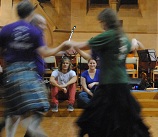Calling Tips
The following are a collection of hints, tips and advice from members of the Reel Club for anyone calling or thinking of calling any dances. Further calling tips (mostly specific to the Reel Club, but may be of some use to similar groups) are available on the Reel Club wiki.
- Always start with relatively easy dances. Everyone then succeeds, and a 'can do' attitude results. If you start with something complicated that takes ages to teach or falls apart, you will end up with a brain-dead flock that can't be bothered.
- Always learn the dance yourself before trying to teach it. Very few dances can be taught well by just reading the instructions out.
- Don't say 'the next dance is difficult..' - much better to say it needs concentration, or is great fun if it works.
- It would be a good idea for weekly group meetings if there were a few dances done regularly so people learn them and could just get up and go. Most groups have some kind of repertoire to fall back on without teaching. If you do all new dances every week it may be great fun for the mentally agile, but will be tiring for the others, and no one will actually learn any dances.
- Do describe figures properly. Several things are now being given the wrong or confusing names. e.g.:- In the Irish Rover it is 'half diagonal rights-and-lefts twice', NOT diagonal rights-and-lefts, which would not be the same figure. In square sets 'interlocking reels of four' are sometimes described as 'banana reels' - but the term 'banana reels' ought really to be for dances like Sloane Square, where they don't go right round. Another one is saying 'set and link' or 'set and link for three' without saying once or twice, because both can happen. It's not kind to leave the dancers counting bars and wondering if they're right.
- Use the proper music if you have it. The wrong tune can confuse people.
- Callers not watching all sets when walking through can result in confusion when they rattle on, leaving a set behind. This is particularly hard to avoid with more than 2 sets.
- It may help to make sure the least experienced set is always nearest the caller. They tend to be most diffident and furthest away.
- Always have a couple of very simple dances (preferably consisting entirely of set figures) which beginners can do with the minimum of teaching. This gives them a sense of achievement and boosts morale.





